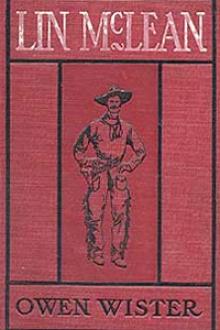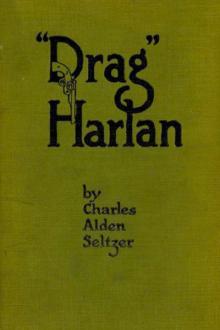The Jimmyjohn Boss, and Other Stories, Owen Wister [easy novels to read txt] 📗

- Author: Owen Wister
Book online «The Jimmyjohn Boss, and Other Stories, Owen Wister [easy novels to read txt] 📗». Author Owen Wister
When I joined him, for I was now willing to do anything, he was apologetic again. “'Tis a short acquaintance,” he said, “but may I also beg your razor? Quick as I get out of the National Fly I am going to register my new label. First there will be Uncle Sam embracing the world, signifying this mixture is universal, then my name, then the word Stropine, which is a novelty and carries copyright, and I shall win comfort and doubtless luxury. The post barber at Fort Bayard took a dozen off me at sight to retail to the niggers of the Twenty-fourth, and as he did not happen to have the requisite cash on his person I charged him two roosters and fifty cents, and both of us done well. He's after more Stropine, and I got Pullman prices for my roosters, the buffet-car being out of chicken a la Marengo. There is your razor, sir, and I appreciate your courtesy.” It was beautifully sharpened, and I bought a box of the Stropine and asked him who the lady was. “Mrs. Porcher Brewton!” he exclaimed. “Have you never met her socially? Why she—why she is the most intellectual lady in Bee Bayou.” “Indeed!” I said. “Why she visits New Orleans, and Charleston, and all the principal centres of refinement, and is welcomed in Washington. She converses freely with our statesmen and is considered a queen of learning. Why she writes po'try, sir, and is strong-minded. But a man wouldn't want to pick her up for a fool, all the samey.” “I shouldn't; I don't,” said I. “Don't you do it, sir. She's run her plantation all alone since the Colonel was killed in sixty-two. She taught me Sunday-school when I was a lad, and she used to catch me at her pecan-trees 'most every time in Bee Bayou.”
He went forward, and I went back with the Stropine in my pocket. The lady was sipping the last of the lemonade and looking haughtily over the top of her glass into (I suppose) the world of her thoughts. Her eyes met mine, however. “Has Gadsden—yes, I perceive he has been telling about me,” she said, in her languid, formidable voice. She set her glass down and reclined among the folds of the bedroom curtains, considering me. “Gadsden has always been lavish,” she mused, caressingly. “He seems destined to succeed in life,” I hazarded. “ah n—a!” she sighed, with decision. “He will fail.” As she said no more and as I began to resent the manner in which she surveyed me, I remarked, “You seem rather sure of his failure.” “I am old enough to be his mother, and yours,” said Mrs. Porcher Brewton among her curtains. “He is a noble-hearted fellow, and would have been a high-souled Southern gentleman if born to that station. But what should a conductor earning $103.50 a month be dispersing his attention on silly patents for? Many's the time I've told him what I think; but Gadsden will always be flighty.” No further observations occurring to me, I took up my necklace and bracelets from the seat and put them in my pocket. “Will you permit a meddlesome old woman to inquire what made you buy those cat's-eyes?” said Mrs. Brewton. “Why—” I dubiously began. “Never mind,” she cried, archly. “If you were thinking of some one in your Northern home, they will be prized because the thought, at any rate, was beautiful and genuine. 'Where'er I roam, whatever realms to see, my heart, untravelled, fondly turns to thee.' Now don't you be embarrassed by an old woman!” I desired to inform her that I disliked her, but one can never do those things; and, anxious to learn what was the matter with the cat's-eyes, I spoke amiably and politely to her. “Twenty dollars!” she murmured. “And he told you they came from the Pecos!” She gave that single melodious croak I had heard once before. Then she sat up with her back as straight as if she was twenty. “My dear young fellow, never do you buy trash in these trains. Here you are with your coat full of—what's Gadsden's absurd razor concoctions—strut—strop—bother! And Chinese paste buttons. Last summer, on the Northern Pacific, the man offered your cat's-eyes to me as native gems found exclusively in Dakota. But I just sat and mentioned to him that I was on my way home from a holiday in China, and he went right out of the car. The last day I was in Canton I bought a box of those cat's-eyes at eight cents a dozen.” After this we spoke a little on other subjects, and now she's busy writing again. She's on business in California, but will read a paper at Los Angeles at the annual meeting of the Golden Daughters of the West. The meal station is coming, but we have agreed to—
Later, Friday afternoon.—I have been interrupted again. Gadsden entered, removed his hat, and shouted: “Sharon. Twenty minutes for dinner.” I was calling the porter to order a buffet lunch in the car when there tramped in upon us three large men of such appearance that a flash of thankfulness went through me at having so little ready-money and only a silver watch. Mrs. Brewton looked at them and said, “Well, gentlemen?” and they took off their embroidered Mexican hats. “We've got a baby show here,” said one of them, slowly, looking at me, “and we'd be kind of obliged if you'd hold the box.” “There's lunch put up in a basket for you to take along,” said the next, “and a bottle of wine—champagne. So losing your dinner won't lose you nothing.” “We're looking for somebody raised East and without local prejudice,” said the third. “So we come to the Pullman.” I now saw that so far from purposing to rob us they were in a great and honest distress of mind. “But I am no judge of a baby,” said I; “not being mar—” “You don't have to be,” broke in the first, more slowly and earnestly. “It's a fair and secret ballot we're striving for. The votes is wrote out and ready, and all we're shy of is a stranger without family ties or business interests to hold the box and do the counting.” His deep tones ceased, and he wiped heavy drops from his forehead with his shirt sleeve. “We'd be kind of awful obliged to you,” he urged. “The town would be liable to make it two bottles,” said the second. The third brought his fist down on the back of a seat and said, “I'll make it that now.” “But, gentlemen,” said I, “five, six, and seven years ago I





Comments (0)